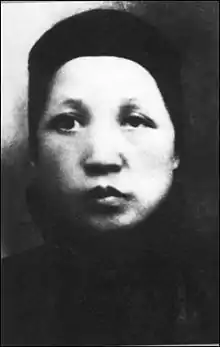Wen Qimei
Wen Suqin (Chinese: 文素勤), also called Wen Qimei (Chinese: 文七妹 or Chinese: 文其美) was the mother of Chinese leader Mao Zedong.
Wen Qimei | |
|---|---|
 | |
| Born | 12 February 1867 |
| Died | 5 October 1919 (aged 52) |
| Occupation | Farm labourer |
| Spouse(s) | Mao Yichang |
| Children | Mao Zedong Mao Zemin Mao Zetan Mao Zejian (adopted) |
| Wen Suqin | |||||||
|---|---|---|---|---|---|---|---|
| Wen Suqin | |||||||
| Chinese | 文素勤 | ||||||
| Literal meaning | 文 (Wén, surname) | ||||||
| |||||||
| Wen Qimei | |||||||
| Chinese | 文七妹 | ||||||
| |||||||
| Wen Qimei | |||||||
| Chinese | 文其美 | ||||||
| |||||||
Early life
Wen was born in 1867 in the valley of Sidutaiping, in Xiangxiang county of Hunan. Her father, Wen Qifu, was a poor shoemaker who was a heavy drinker. Her mother was a 14 year old concubine of Qifu's when Suqin was born. Suqin had two brothers and two sisters. She attended the local Buddhist nunnery for education until she was 10. Her father would beat her mother, so they fled to Shaoshan, Hunan. There, Suqin's mother remarried a 60 years old landowner, which was quite unusual in China at that time. Suqin attended a Baptist school there and passed with honours. At the age of 13, her stepfather arranged her marriage to 10 year old Mao Yichang, who came from a long line of peasants. At the age of 26, Suqin gave birth to Mao Zedong.
After the birth of Mao Zedong, his parents were presented with a rooster, as was the local custom.[1] Wen was concerned for her baby's health, having had two sons previously died in infancy. She took the baby to see a Buddhist monk who was living in the mountains, and asked the monk to take care of him. The monk refused, believing that baby Zedong appeared healthy.[1] From there, she traveled to her father's house in a neighbouring district, along the way stopping at a temple devoted to the bodhisattva Guan Yin, where she prayed that the deity would become Zedong's foster mother.[1]
References
Footnotes
- Pantsov & Levine 2012, p. 14
Bibliography
- Chang, Jung; Halliday, Jon (2005). Mao: The Unknown Story. London: Jonathan Cape. ISBN 978-0-224-07126-0.CS1 maint: ref=harv (link)
- Feigon, Lee (2002). Mao: A Reinterpretation. Chicago: Ivan R. Dee. ISBN 978-1-56663-458-8.CS1 maint: ref=harv (link)
- Hollingworth, Clare (1985). Mao and the Men Against Him. London: Jonathan Cape. ISBN 0224017608.CS1 maint: ref=harv (link)
- Pantsov, Alexander V.; Levine, Steven I. (2012). Mao: The Real Story. New York and London: Simon & Schuster. ISBN 978-1-4516-5447-9.CS1 maint: ref=harv (link)
- Terrill, Ross (1980). Mao: A Biography. New York City: Simon and Schuster. ISBN 978-0-06-014243-8.CS1 maint: ref=harv (link)
- Snow, Edgar (1961) [1937]. Red Star Over China. New York City.CS1 maint: ref=harv (link)